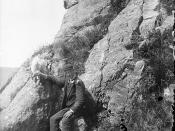There is no word in these verses about Corinthian factions, and there's hardly anything much about Christians. Instead, it's all about Jews and Greeks. All of their avant-garde philosophies, all of their theories about worldly matters, all of the ways in which those sophisticated idolatries demand signs or want proof and thereby arrive at what they call wisdom. Sure, they stroke their beards and sip their sherry and have their silly little circular conversations with one another and get written up on a piece of parchment but they wouldn't know real wisdom, Paul says, if it slapped them in the face.
If they want to know real wisdom, Paul says, they've got to stand on their heads and behold the way the world looks when it's upside down. Only when they're standing on their heads will they be able to see that their wisdom look like foolishness--what with its attempt to invent God in their own image! Only then will they begin to get that the foolishness of the cross is a scandal to the Jews because, for Jews, gods don't dwell with people as well as it is a lack fo understanding to the Greeks because, for Greeks, gods don't die.
The Jews believe that God dwells far removed from people in the holy of holies, but the foolishness of the cross depicts a God who comes to dwell in the dirt and grime of human life. And the Greeks believe that God does the sorts of things that wise people do, but the foolishness of the cross is when weakness becomes its own kind of strength, which goes against all logic for the Greeks. So that, for both Jew and Greek, what God is up to in our midst rebuts what we expect and assume about God. The God that Paul is talking about is so above what we can imagine as our notions of God so partial and off-the-mark.
It's a very important argument! But, like I said, it appears to be a colossal change of subject! What does it have to do with all the factionalism that Paul is so steamed about in that church in Corinth? Unless. . .unless, as a rhetorical strategy, Paul is moving from anger to subtlety. Paul is making the case that the Christian theology with these bias opinions in Corinth is not one whit better than that of the Jews or the Greeks. Not one whit better! In this extended insertion about the Jews and the Greeks, he has drawn them a picture which he hopes, they will study and they see themselves drawn there. Behaving with their bias' glimpses of God are the complete picture of God; and, proud as they are of what they think they know about God, they are standing in the same spiritual wasteland as the wisdom of the rest of the world.
And from that perspective, after almost two chapters of reflection about that pitiful, insufficient wisdom of the world, Paul returns to his initial argument. "And so, brothers and sisters, I could not speak to you as spiritual people, but rather as people of the flesh, as infants in Christ. I fed you with milk, not solid food, for you were not ready for solid food. Even now you are still not ready, for you are still of the flesh. For as long as there is jealousy and quarreling among you, are you not of the flesh, and behaving according to human inclinations? For when one says, 'I belong to Paul,' and another, 'I belong to Apollos,' are you not merely human? An elaborate drawing of godless, so-called "wisdom" in which, if we look carefully, we will see ourselves. All hunkered down in our factions. As Paul says later on in this letter, it's really about a love that bears all things, believes all things, hopes all things, endures all things.
And if we are, in fact, "God's Temple," as Paul puts it, maybe someday we, too, will despise, and want to be rid of the crud in our lives that we are comfortable in and do that which God desires from us; until we might embody, for God's sake, the sort of foolishness that rebuts and redeems the sad, tired wisdom of the world. That is not the foolishness Paul would have us aspire to. That is not the building Paul would have us be.


